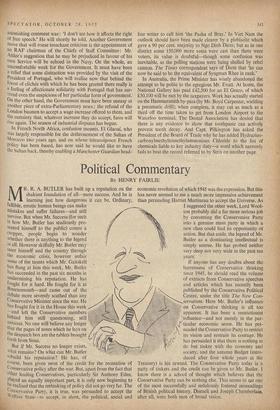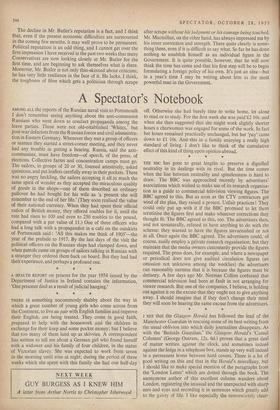Political Commentary
BY HENRY FAIRLIE R. R. A. BUTLER has built up a reputation on the shakiest foundation of all—mere success. And he is anxious. No one will believe any longer / that the pages of notes which he lays on the despatch box are the tablets brought fresh from Sinai. 6 But if Mr. Success no longer exists, what remains? On what can Mr. Butler tehuild his reputation? He has, of course, been given most of the credit for the recreation of Conservative policy after the war. But, apart from the fact that ether leading Conservatives, particularly Sir Anthony Eden, Played an equally important part, it is only now beginning to be realised that the rethinking of policy did not go very far. The Conservative Party, it is true, was persuaded to accept the Welfdre State—to accept, in short, the political, social and If anyone has any doubts about the barrenness of ConservatiVe thinking since 1945, he should read the volume of extracts from Conservative speeches and articles which has recently been published by the Conservative Political Centre, under the title The New Con- servatism. Here Mr. Butler's influence on Conservative thinking is all too apparent. It has been a restrictionist influence—and not merely in the par- ticular economic sense. He • .has per- suaded the Conservative Party to restrict its vision and restrain its courage. He has perguaded it that there is nothing to do but tinker with the economy and society, and the autumn Budget (intro- duced after four whole. years at the Treasury) is his reward. The Conservative Party today is a party of tinkers and the credit can be 'given to Mr. Butler. I know there is a school of thought which believes that the Conservative Party can be nothing else. This seems to me one of the most successfully and sedulously fostered misreadings of British political history. Disraeli and Joseph Chamberlain. after all, were both men of broad vision. The decline in Mr. Butler's reputation is a fact, and I think that, even if the present economic difficulties are surmounted in the coming few months, it may well prove to be permanent. Political reputation is an odd thing, and I cannot get over the firm impression I have received in the past two weeks that many Conservatives are now looking closely at Mr. Butler for the first time, and are beginning to ask themselves what is there. Moreover, Mr. Butler is not only thin-skinned about criticism; he has very little resilience in the face of it. He lacks, I think, the toughness of fibre which gets a politician through scrape after scrape without his judgment or his courage being touched. Mr. Macmillan, on the other hand, has always impressed me by his inner conviction and strength. There quite clearly is some- thing there, even if it is difficult to say what. So far he has done nothing to establish himself as an individual figure in the Government. It is quite possible, however, that he will now think the time has come and that his first step will be to begin formulating a foreign policy of his own. It's just an idea—but in a year's time I may be writing about him as the most powerful man in the Government.



































 Previous page
Previous page